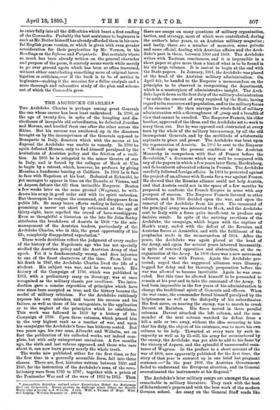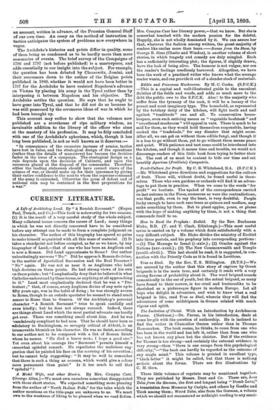THE ARCHDUKE CHIRLES.* THE Archduke Charles is perhaps among great
Generals the one whose career has been least understood. In 1796, at the age of twenty-five, in spite of the bungling and dis- obedience of incapable old subordinates, he defeated Jourdan and Moreau, and hustled them one after the other across the Rhine. But his success was swallowed up in the disasters brought on by the incompetence of the Generals opposed to Bonaparte in Italy, disasters which with the means at his disposal the Archduke was unable to remedy. In 1799 he again defeated Moreau, only to find himself paralysed by the hesitations of Austrian policy and the friction of a coali- tion. In 1805 he is relegated to the minor theatre of war in Italy, and is forced by the collapse of Mack at Ulm to begin by a retreat, which, however, he prefaces by giving Massena a handsome beating at Caldiero. In 1809 he is face to face with Napoleon at his best. Defeated at Eckmiihl, he yet manages to appear in time on the Danube at Vienna, and at Aspern defeats the till then invincible Emperor. Beaten a few weeks later on the same ground (Wagram), he with- draws his army in good order and with its spirit unbroken. But thereupon he resigns the command, and disappears from public life. So many brave efforts ending in failure, and so promising a career cut short by retirement at the age of thirty-eight, have repelled the crowd of hero-worshippers. Even so thoughtful a historian as the late Sir John Seeley attributes the breakdown of Austria in 1809 "to the mis- management of the Austrian leaders, particularly of the Archduke Charles, who in this, the great opportunity of his life, completely disappointed expectation."
These words doubtless reflect the judgment of every reader of the history of the Napoleonic age who has not specially studied the Austrian policy and the Austrian Army of that epoch. Yet it is fundamentally wrong, and does injustice to one of the finest characters of the time. From 1809 to his death in 1847, the Archduke Charles lived the life of a student. His subject was war, and he wrote much. His history of the Campaign of 1796, which was published in 1813, with a preliminary essay on Strategy, was at once recognised as the military classic par excellence. The intro- duction gave a concise exposition of principles which have ever since been accepted as true, and the history became the model of military criticism. For the Archduke ruthlessly exposes his own mistakes, and traces his success and his failure, as well as those of his antagonists, to the application or to the neglect of the principles which he establishes. This work was followed in 1819 by a history of the Campaign of 1799. Upon these volumes, which placed him in the very highest rank as a teacher of war, and upon his campaigns the Archduke's fame has hitherto rested. But two years ago, his two sons, Albrecht and Wilhelm, set on foot the publication of his collected works, not indeed com- plete, but with only unimportant omissions. A few months ago, the sixth and last volume appeared, and those who care about it, can now learn pretty nearly the whole truth.
The works now published either for the first time, or for the first time in a generally accessible form, fall into three classes. There are, first, histories written between 1830 and 1840, for the instruction of the Archduke's sons, of the revo- lutionary wars from 1792 to 1797 ; together with a prkis of the Peninsular War and of the wars of 1812 to 1815. Then
• Ausgewdhlte Schriften wei.1and seiner Kaiserlichen Iloheit des Ershersogs Carl ton 0e,terreich. HeranTeveben im Anftrage seiner Sohn der Herren Erzbe. edge kbrecht d Wilhelm. 8 vols. With a Volume of Maps. Wien and Leipzig: Wilhelm Branmal er. 15'93 94.
there are essays on many questions of military organisation, tactics, and strategy, most of which were contributed, during the author's later years, to an Austrian military magazine ; and lastly, there are a number of memoirs, some private and some official, dealing with Austrian affairs and the Arch- duke's part in them, between 1800 and 1809. The Archduke writes with Tacitean conciseness, and it is impossible in a short paper to give more than a hint of what is to be found in his six large volumes. It is easiest to begin at the end with the State papers. In January, 1801, the Archduke was placed at the head of the Austrian military administration. On April 4th, he handed to the Emperor a memorandum on the principles to be observed in reorganising the department, which is a masterpiece of administrative insight. The Arch- duke lays it down as the first duty of the military administration " to settle the amount of army required by the State, having regard to its resources and population, and to the military forces of its enemies." He then surveys the whole field of military administration with a thoroughness of grasp and a breadth of view that cannot be excelled. The Emperor Francis, his elder brother, approved of the ideas, and the Archduke set to work to carry them out. But he was opposed and obstructed at every turn by the whole of the military bureaucracy, by all the old incompetent Generals, and by the multitude of aristocratic aspirants to place and power. The Archduke was bent upon the regeneration of Austria. In 1802 he sent to the Emperor a "Memoir upon the present condition of the Austrian Monarchy in comparison with that of France before the Revolution," a document which may well be compared with any of the papers in which a few years later Stein, Hardenberg, and Scharnborst advocated reform in Prussia. The Archduke carefully followed foreign affairs. In 1804 be protested against the project of an alliance with Russia for a war against France. He showed that the Russian alliance could not help Austria, and that Austria could not in the space of a few months be prepared to confront the French Empire in arms with any prospect of success. The Emperor Francis listened to other advisers, and in 1805 decided upon the war, and upon the removal of the Archduke from his post. The command of the principal army was intrusted to Mack, and the Archduke sent to Italy with a force quite insufficient to produce any decisive result. In spite of the untiring exertions of the Archduke, the campaign, which began with the capture of Mack's army, ended with the defeat of the Russian and Austrian forces at Austerlitz, and with the fulfilment of the prophecies made in the memorandum of 1804. After the peace, the Archduke was again placed at the head of the Army, and again for several years laboured incessantly, in spite of renewed opposition and obstruction, at the re- organisation of the Army. In 1808 there was a new movement in favour of war with France. Again the Archduke pro- tested; urged that the suggested alliances were illusory ; begged for delay and for thorough preparation before the war was allowed to become inevitable. Again he was over- ruled. But this time he allowed himself to be persuaded to remain at his post and to take the command of the Army. It had been impossible in the few years of his administration to change the traditional spirit of Generals and officers. When the war came, the commander found himself paralysed by the helplessness as well as the disloyalty of his subordinates. His first move, on nearing the enemy, was to march to crush Davout at Ratisbon. His force moved in three parallel columns. Davout attacked the left column, and the com- mander of the next column watched its defeat from a hill a mile or two away, without the idea occurring to him that his duty, the object of his existence, was to move his own column to its help. Thwarted at every turn by such in- capacity as well as by ill-will, his army far outnumbered by the enemy, the Archduke was yet able to add to his fame by the victory of Aspern, and the splendid if unsuccessful resis- tance of Wagram. In the preface to a short account of the war of 1809, now apparently published for the first time, the story of that year is summed up in one brief but pregnant sentence :—" In the year 1809, the Austrian Government failed to understand the European situation, and its General overestimated the instruments at his disposal."
The Archduke's later military essays are amongst the most remarkable in military literature. They rank with the best of Scharnhorst'a papers and with the best work of the modern German school. An essay on the General Staff reads like
an account, written in advance, of the Prussian General Staff of our own time. An essay on the method of instruction in tactics anticipates the system of problems now everywhere in vogue.
The Archduke's histories and precis differ in quality, some of them being so condensed as to be hardly more than mere summaries of events. The brief survey of the Campaigns of 1796 and 1797 (not before published) is a masterpiece, and adds essentially to our insight into the subject. For example, the question has been debated by Clausewitz, Jomini, and their successors down to the author of the Belgian precis published in 1889, whether it would not have been better in 1797 for the Archduke to have resisted Napoleon's advance on Vienna by placing his army in the Tyrol rather than by interposing it between Napoleon and his objective. The Archduke settles the question. He says that he ought to have gone into Tyrol, and that he did not do so because he was still possessed by the erroneous ideas of war in which he had been brought up.
This account may suffice to show that the volumes now published are a storehouse of ripe military wisdom, an invaluable addition to the library of the officer who aims at the mastery of his profession. It may be fitly concluded with one of the Archduke's aphorisms, which, though it has long been published, is not as well known as it deserves :— " In consequence of the excessive increase of armies, tactics have lost in value, and the strategical design of the operations (rather than the details of manoeuvre) has become the decisive factor in the issue of a campaign. The strategical design as a rule depends upon the decisions of Cabinets, and upon the resources placed at the disposal of the commander. Therefore either the leading statesmen should have correct views of the science of war, or should make up for their ignorance by giving their entire confidence to the man to whom the supreme command of the army is entrusted. Otherwise the germ of defeat and of national ruin may be contained in the first preparations for a war."



































 Previous page
Previous page